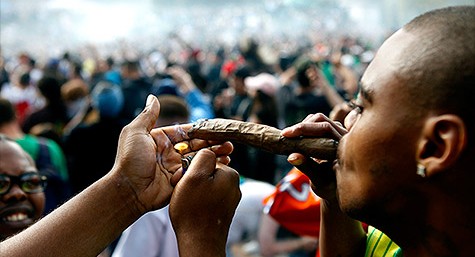LOME, Togo – Until recently it seemed that no one in Africa was ready to challenge and repudiate the United States and the United Nations’ resolve to storm Africa with their international forces in a bid to rid it of drugs.
The war on drugs has failed in America to address the fundamental problems of narcotic and psychotropic drug abuse and addiction. Codified in a United Nations convention, the war on drugs, especially in the United States, has proved impervious to decades of failure.
Drug consumption has not, in most parts of the world, fallen. Prohibition has only inflicted appalling damage, through the spread of organized crime, the needless deaths of addicts exposed to adulterated drugs and worst of all, the untold hardships visited upon the African American Communities in the United States through the mass incarceration of young Black men in America.
If anything is worth writing home about, America’s infamous reputation and expertise in fighting narcotics is supreme. It has succeeded in reviving a cast system, a new Jim Crow, where African Americans have been targeted, their families and livelihoods destroyed and the communities shattered.
Black men are slaves to a privatized white prison system that manufactures goods for free, provides services for close to nothing, and grows food to stock the ever-expanding Whole Foods market that feeds the majority-wealthy white class.
Instead of owing up to the havoc it has visited upon the African American community and implement policies towards restoring it, the US government is turning its head to Africa itself, the motherland of the thousands and millions of African Americans it has summarily for the past 400 years dehumanized.
Why has the United States changed its focus to Africa. The question that Africans are beginning to ask is, ‘if this war on drugs didn’t work in the United Sates, why is it being re-launched on African soil?”
Once bitten, twice shy; will Africa fall victim to a calculated war?
We cannot but smell an ulterior motive. Allowing capital from America to once again bloody its coast with a slave system parading through its coasts, clad in the armor of a war on drugs, will be devastating.
Latin America’s experience with the United States in combating drugs is something Africa is beginning to review and learn from. The truth is, many Latin American countries are tired of trying to suppress the production of illegal drugs. This is not surprising since the death toll associated with efforts to combat the drug business has risen to the level of conventional war in these countries.
African countries cannot afford such an expensive and casualty heavy insurrection against drugs (which is not even an enemy). We have better ways to spend our time and money and not kill and enslave our own children in the name of cleansing them from evil drug spirits.
Courageously, Mexicans have spoken out and complained that the notion of the so-called “shared responsibility” on fighting drugs proclaimed by international bureaucrats all around the world only meant that their people get killed whereas the United States, with its soft gun laws, arms the traffickers in Mexico, launders their money and consumes their product.
We cannot be fooled by a war that has long been argued to be illiberal in principle and that would be harmful to Africans in practice. The least bad way of dealing with drugs is to legalize and regulate their production and consumption. This has been the culture and social order in Africa. Traditionally, no substance has ever been banned. And we haven’t had close to the many problems that prohibition in the United States produced and continue to generate.
A whiff of fresh thinking has come in handy.
Already, officials in two American states, Colorado and Washington, are pondering how to implement their voters’ decisions in referendums to legalize marijuana (cannabis). A dozen countries in Europe and the Americas have deemed the possession of some drugs no longer to be criminal offence. A few Latin American presidents want a rethink of the war on the supply and trafficking of drugs.
This new thinking, though limited, is therefore welcome. Legalizing consumption allows drug use and addiction (by no means the same thing) to be treated as the public-health issues that they are. That means applying the principle of harm reduction, for example by providing clean needles to addicts to prevent the spread of HIV.
But decriminalizing consumption does nothing to break the grip of gangsters over the drug business. For that to happen, production and distribution also need to be legalized!











Nothing irks me more than this war on drugs. And now in Africa? When will the capitalists stop. At some point we have to draw the line in Africa.
You cannot summarily blame white people for the devastation that the war on drugs has brought to the African American community in the USA. You have to acknowledge that the African American political class is in bed with the insatiable white capitalists. This clarification is necessary to understand the full extent of the damage that the drug war on America has caused a whole race of people.
That said, I agree that Africa needs to be careful! No good can stem from a war on drugs. But at the same time, everything cannot be legal under the African Sun.